How the 16 Myers-Briggs® Personality Types Feel About Social Media
I’ve been very curious for a long time about the differences between the different personality types and how they feel about social media and smartphones. The world today feels so connected via apps like Facebook, Twitter, and Snapchat, but many people feel disconnected and lonely in real life. A new Meta-Gallup survey, taken across 142 countries, found 24% of people age 15 and older self-reported feeling very or fairly lonely in response to the question ,”How lonely do you feel?”
With that in mind, I decided to survey my email list and social media followers to see what their thoughts were on social media, as well as how often they liked to use it, and whether or not it helped them develop closer relationships. As of today I have 2,340 respondents to the survey, and with that in mind I’m going to share some of the results so we can see what the most common perceptions are among the 16 types. Let’s get started!
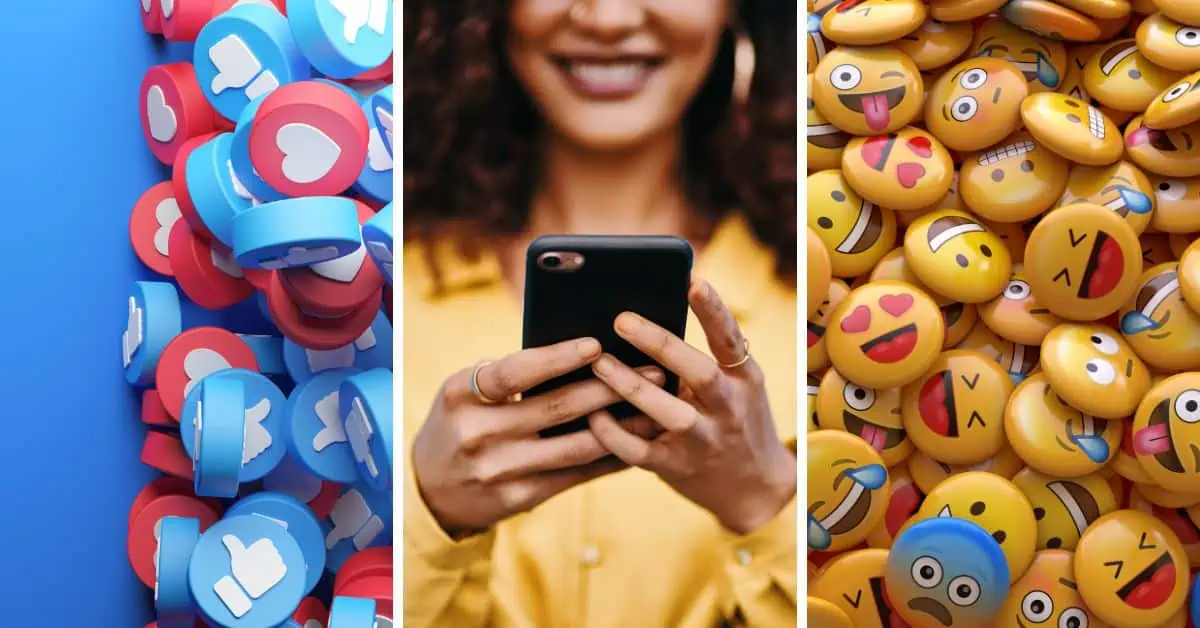
Not sure what your personality type is? Take our personality questionnaire here. Or you can take the official MBTI® here.
How the 16 Myers-Briggs® Personality Types Feel About Social Media
Estimated reading time: 23 minutes
The ISTP Personality Type
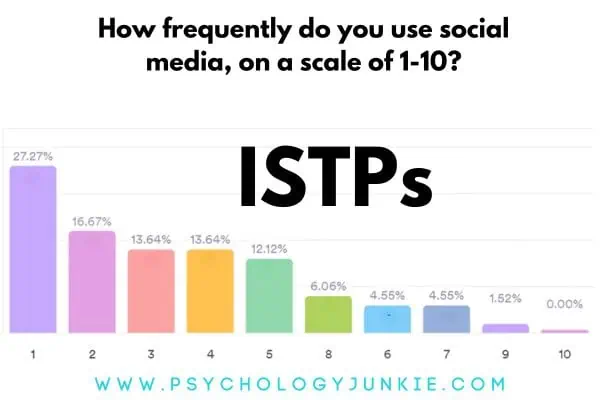
Let’s start with the “Vigilantes” themselves: the ISTPs. These types don’t seem to be big fans of social media. When asked on a scale of 1-10 how often they used social media every day, with 1 being “Not at All” and 10 being “Extremely Often”, 1 got the highest number of votes. In fact, when I asked the question, “Do you think social media is mostly healthy or unhealthy for people?” 86.15% said it was mostly unhealthy for people. Most ISTPs prefer to use their phones for research, reading the news, or playing games over chatting on social media or texting their friends. 64.18% of ISTPs said they did not feel like social media helped them to develop closer relationships with others, while 26.87% said it only helped a small amount, and 8.96% said yes, it had helped them. Okay, so from the results, we can see that ISTPs aren’t likely to spend hours on Twitter, Facebook, or Instagram. What social media channel do they prefer (if they HAD to choose)? Reddit came out on top for ISTPs; they use the forum to improve their research, get and share useful information, and even get into some friendly arguments.
More About ISTPs and Social Media:
- 75.76% of ISTPs would rather get information via a news site or blog than other means (social media, podcast, short or long-form video)
- 17.65% of ISTPs said they frequently find themselves losing hours of time to scrolling on social media
- Only 5.97% of ISTPs said they struggled with comparing themselves to others on social media
Discover more about ISTPs: 10 Things ISTPs Look for in a Relationship
The ENFJ Personality Type
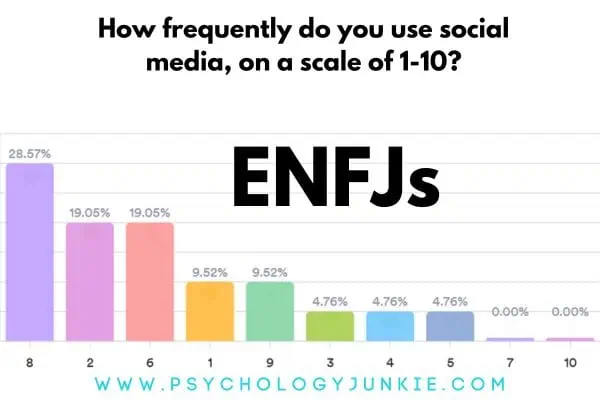
Now we flip to a wildly different end of the personality spectrum with ENFJs. When I asked ENFJs on a scale of 1-10 how frequently they used social media on a daily basis, with 1 being “Not at all” and 10 being “Extremely Often,” 8 got the highest number of votes. Yet even ENFJs see the potential problems with social media, with 76.47% admitting that they think social media is mostly unhealthy for people, and only 23.53% saying it was mostly healthy for people. 38.10% of ENFJs said that social media had helped them to develop closer relationships with other people, and 33.33% said that it had helped them “only a little.” 19.05% of ENFJs said that they struggled with comparing themselves to others on social media. When I spoke to several ENFJs about this, they said that their natural attention to social standing and the many factors that influence perception made them especially attuned to areas that they felt “lacking in” compared to others. It was difficult for some of them to not feel like they needed to “bend” to be more like the people they admired or the more popular people in their social groups.
More About ENFJs and Social Media:
- 47.62% of ENFJs said they prefer to get their information via news or blog sites, while 19.05% said they prefer to get information via podcasts, and 14.29% voted for long-form videos.
- 23.81% of ENFJs said they frequently found themselves scrolling social media for hours.
- Facebook was the most popular social media channel for ENFJs, followed by Instagram, then Twitter/X.
The ISFP Personality Type
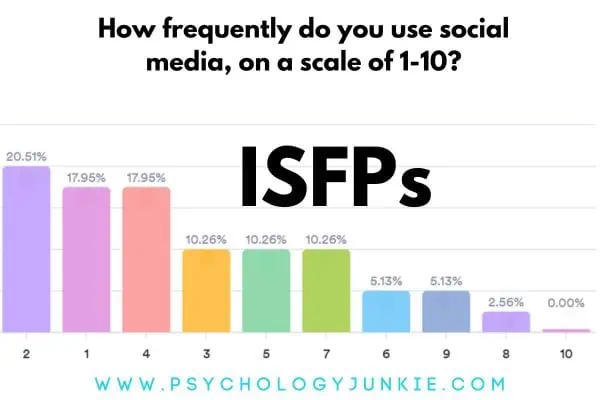
ISFPs were less fond of social media than their extroverted counterparts, preferring instead to watch TV shows, research, or play games on their smartphones. When I asked ISFPs to rate on a scale of 1-10 how frequently they used social media on an average day, 20.51% chose “2”, with 17.95% tied between “1” and “4.” But how do ISFPs feel about social media’s impact on society at large? 76.32% of ISFPs said they thought that social media was “mostly unhealthy for people,” while 23.68% said it was “mostly healthy for people.” A few ISFPs emailed me personally and said that they saw how fragmented communities were due to social media, how they experienced cyber bullying via social media as teens, and how they felt social media promoted a superficial image of success rather than creating real, meaningful connections. When it came to comparisons, 1 in 10 ISFPs said that they struggled with comparing themselves with people they saw on social media.
More About ISFPs and Social Media:
- The most popular social media channel for ISFPs was Instagram, followed by TikTok.
- 1 in 10 ISFPs said social media had helped them develop closer relationships with other people
- 37.50% of ISFPs said they frequently found that they’d lost hours to scrolling on social media
Discover more about ISFPs: 10 Things You Should Never Say to an ISFP
The ENTJ Personality Type
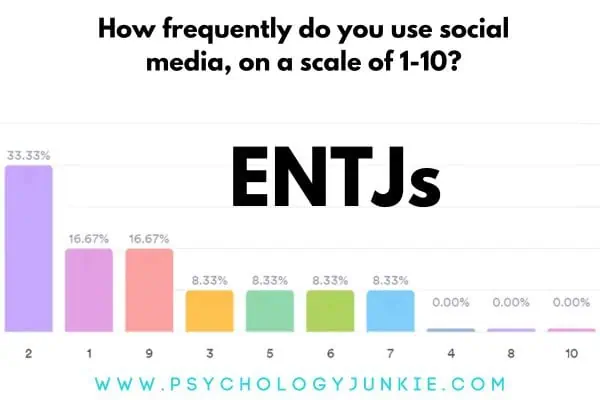
There was a wide variety of responses from ENTJs about their social media use. When asked how frequently they used social media on a scale of 1-10, with 1 being “not at all” and 10 being “extremely frequently”, 33.33% of ENTJs answered with “2”, followed by a tie of 16.67% answering “1” and “9.” In my conversations with ENTJs, many mentioned that they primarily used social media for work, particularly LinkedIn. They also enjoyed learning via social media forums like Reddit or Quora. As far as social media’s impact on society, 64.71% of ENTJ respondents said they thought social media was “mostly unhealthy for people” with 35.29% saying that it was “mostly healthy for people.” Overall, ENTJs weren’t as interested in mindlessly scrolling social media as much as networking through LinkedIn, learning information, and accomplishing various goals.
More About ENTJs and Social Media:
- 29.41% of ENTJ respondents said they struggled with comparing themselves to others on social media
- LinkedIn and Reddit were the favorite social media channels of ENTJs
- 31.25% of ENTJs said that social media had helped them develop closer relationships with others
Find out more about ENTJs: Understanding ENTJ Thinking
The INTP Personality Type
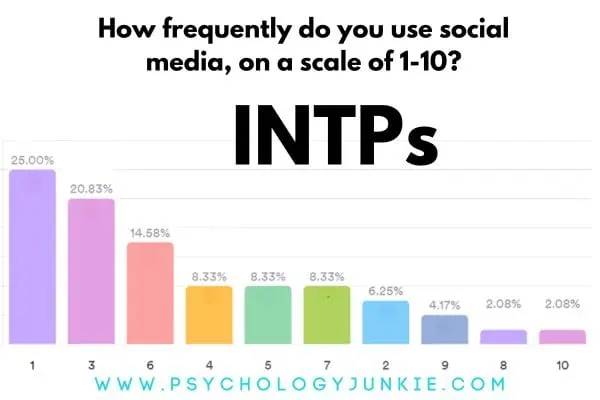
Like their ISTP type-siblings, INTPs were not avid users of social media. When asked on a scale of 1-10 how often they used social media, with 1 being “Not at all” and 10 being “Extremely often”, “1” got the most votes, followed by 3, then 6. When it came to what INTPs did enjoy doing on their smartphones, that revolved more around research and reading ebooks. And INTPs had a fairly dismal view of social media as well, with 80.43% saying that it was “mostly unhealthy for people” versus 19.57% saying it was “mostly healthy for people.” When I spoke with several INTPs during this process, they suggested that social media produced algorithms that catered to illogical and emotion-driven ways of responding to information. They felt like platforms like Facebook, Twitter, and TikTok sparked an “animal brain” emotional response from people that allowed disinformation to spread and real, analytical thought to diminish. I happen to agree with them, to be honest!
More About INTPs and Social Media:
- 22.45% of INTPs said social media had helped them to develop closer relationships with others.
- 12.24% of INTPs said they struggled with comparing themselves to others on social media
- Instagram and Reddit tied for the most popular social media apps for INTPs
- 26.53% of INTPs said they frequently found themselves losing hours to scrolling on social media
Discover more about INTPs: 24 Signs That You’re an INTP, the Prodigy Personality Type
The ESFJ Personality Type
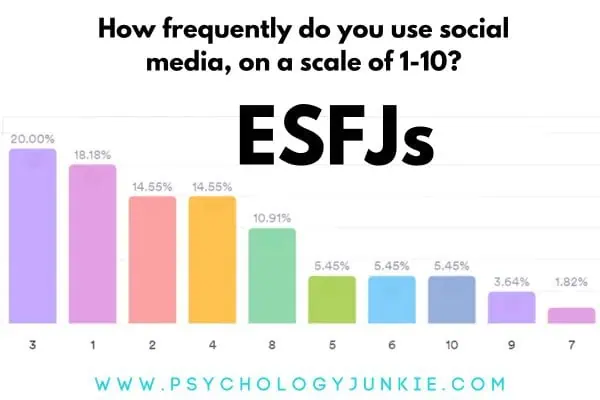
Overall, ESFJs had fairly low social media usage. When asked how frequently they used social media on a scale of 1-10 with 1 being “not at all” and 10 being “extremely often”, 20% responded with “3”, followed by 18.18% who answered with “1” and 14.55% who answered with “2.” When I spoke with ESFJ respondents more in depth, it seemed that they preferred communicating via phone call and text rather than through social media, but they did enjoy perusing Facebook and Instagram to keep up with family and friends, particularly to see photos and watch videos of their lives. 83.33% of ESFJs said that they felt that social media was “mostly unhealthy for people”, with only 16.67% saying it was “mostly healthy for people.” When ESFJs expounded on this more, they suggested that social media leads to negative comparisons between people and it does little to actually bring people together in real life. They didn’t like “twitter wars” or the way people often fought and argued over social media without trying to see the other person’s point of view.
More About ESFJs and Social Media:
- 25% of ESFJs said they frequently lose hours to scrolling on social media
- 16.36% of ESFJs said that social media had helped them to develop closer relationships with others
- 16.36% of ESFJs said they struggled with comparing themselves to others on social media
- Facebook and Instagram were the most popular social media apps for ESFJs
The INFP Personality Type
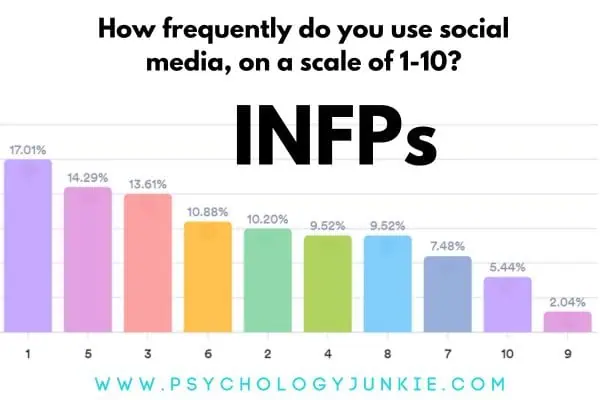
INFPs showed fairly low to moderate usage of social media overall. When I asked them to rate how frequently they used social media on a scale of 1-10, with 1 being “not at all” and 10 being “extremely often,” 1 got the most votes (17.01%), but five followed closely behind with 14.29%. Like most of the types I surveyed, INFPs felt fairly negative about social media and its implications on society. 77.55% said that they felt social media was “mostly unhealthy for people”, with only 22.45% suggesting it was “mostly healthy for people.” Most INFPs who expounded on this more said that they felt social media was causing people to lose something about themselves; to become more focused on image and superficial appearances of success rather than anything meaningful. A couple INFPs also came to the defense of social media, saying that they had been able to find friends who enjoyed similar topics of conversation whereas it had been a struggle to find people with the same niche interests in their local communities.
More About INFPs and Social Media:
- 40.94% of INFPs said they frequently lost hours to scrolling on social media
- 19.33% of INFPs said that social media had helped them develop closer relationships with others
- 19.87% of INFPs said they struggled with comparing themselves to others on social media
- Facebook was the most popular social media channel for INFPs, followed by Instagram, then Twitter/X
Find out more about INFPs: INFP Personality Profile In-Depth
The ESTJ Personality Type
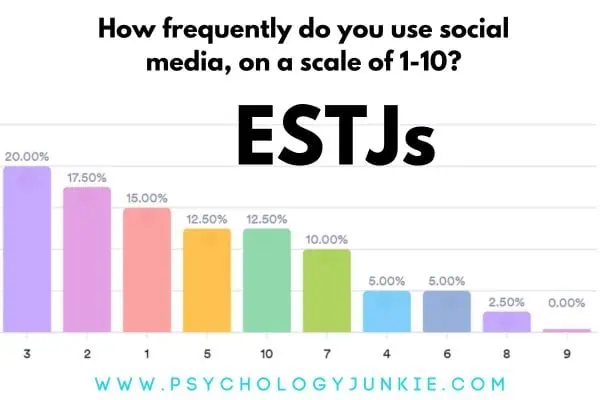
ESTJs showed fairly low to moderate use of social media, with “3”, “2”, and “1” getting the most votes when I asked them how frequently they used social media on a scale of 1-10. But this really seemed to be a mixed bag of results so I corresponded with some of the ESTJs to find out what they typically used social media for. The ESTJs who responded to my email talked about how they enjoyed staying connected with family and friends via social media as well as networking for work via platforms like LinkedIn. That said, they didn’t like “doom scrolling” or losing track of time on social media, and many had limits set on their apps so that they wouldn’t waste too much time. That said, 25.58% of ESTJs still responded “Yes” when asked “Do you frequently find yourself losing hours of14 time to scrolling on social media?”.
More About ESTJs and Social Media:
- 14.29% of ESTJs said that social media had helped them develop closer relationships with others, with 40.48% saying that social media had helped them “only a little” with developing closer relationships.
- 9.52% of ESTJs said they struggled with comparing themselves to others on social media
- Facebook, Instagram, and LinkedIn were the most popular social media channels for ESTJs
- 77.50% of ESTJs said that they thought social media was “mostly unhealthy for people”, while 22.50% said it was “mostly healthy for people.”
The ISTJ Personality Type
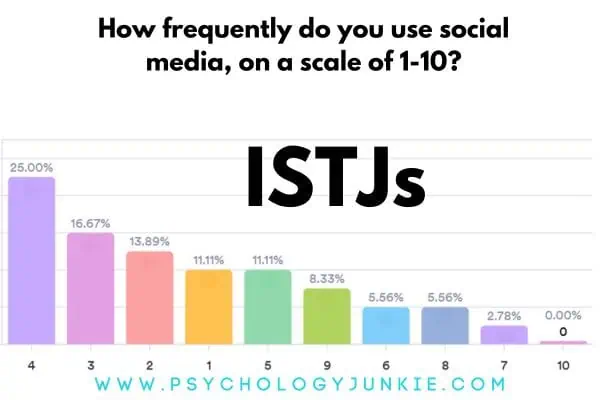
When I asked ISTJs how frequently they used social media on an average day, with 1 being “Not at all” and 10 being “Extremely frequently”, 4, 3, and 2 got the most votes. Overall, ISTJs had a fairly negative view of social media’s impact on people in general, with 89.19% saying that social media was “mostly unhealthy for people” and 10.81% saying it was “mostly healthy for people.” When speaking with ISTJs personally about this, I found that they believed social media caused people to form quick judgments without taking in enough relevant information. They were skeptical of “news” or other information shared on social media, because many times it lacked proper sourcing or authority, and they found it disheartening to see disinformation spreading rapidly. When it came to what they used social media for, most ISTJs used it to keep up with family or share important information with friends and family. Facebook was the social media app that had the most votes for preferred social media platform, followed by Instagram, then TikTok.
More About ISTJs and Social Media:
- 28.95% of ISTJs said they frequently found themselves losing hours to scrolling on social media
- 7.89% of ISTJs said that social media had helped them develop closer relationships with others, while 28.95% said it had helped them “only a little.”
- 13.51% of ISTJs said they struggled with comparing themselves to others on social media
Discover more about ISTJs: 24 Signs That You’re an ISTJ, the Detective Personality Type
The ENFP Personality Type
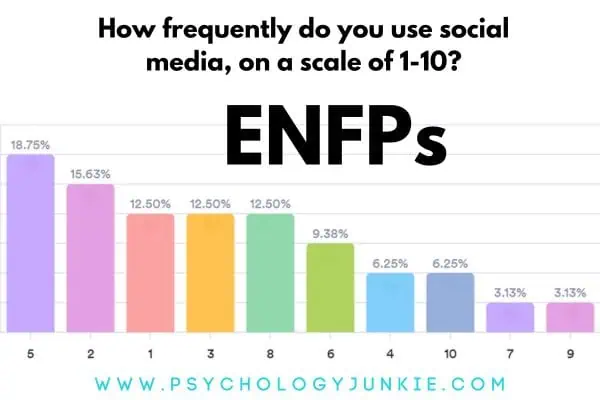
When I asked ENFPs to rate how frequently they used social media on an average day, on a scale of 1-10 with 1 being “Not at all” and 10 being “Extremely frequently,” 5 got the most results (18.75) followed by 2 (15.63%), and 1, 3, and 8 tied for third place with 12.50% each. When asked which social media apps they enjoyed most, Facebook got the most votes (23.80%), followed by Instagram (20.75%), LinkedIn (13.21%), and TikTok (9.43%). When I narrowed down these results by age, that played a significant role as well. ENFPs aged 35+ preferred Facebook, Instagram, and LinkedIn, while ENFPs aged 17-35 preferred TikTok and Snapchat. Overall, ENFPs, like most of the types, were wary of social media’s effects on people. 67.74% said they thought social media was “mostly unhealthy for people”, while 32.26% said it was “mostly healthy for people.” This was actually far more positive than the results for most of the types, so I asked more questions. Many ENFPs saw both the good and negative in social media. They believed that it could bring people together, help them share ideas, broaden their worldviews, and be inspired by people from different walks of life all around the world. They also mentioned that a lot of people used social media for the opposite reasons; to become more entrenched in their own worldview, to stay within echo chambers that confirmed their own biases, or that people used social media for cyber bullying rather than to connect and raise others up.
More About ENFPs and Social Media:
- 43.75% of ENFPs said they frequently lose hours to scrolling on social media
- 27.27% of ENFPs said that social media had helped them build closer relationships with others, with 39.39% saying that it had helped them “only a little.”
- 21.88% of ENFPs said they struggled with comparing themselves to others on social media
Find out more about ENFPs: The ENFP Visionary – An In-Depth Profile
The ISFJ Personality Type
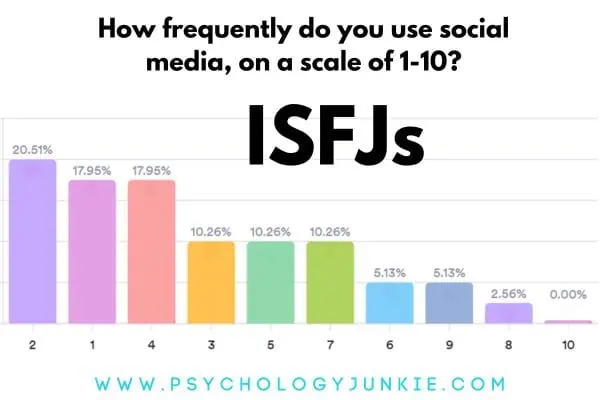
ISFJs showed fairly low use of social media in general. When asked to rate on a scale of 1-10 how frequently they used social media on an average day, “2” got the most results with 20.51%, while 1 and 4 tied for second place with 17.95%. ISFJs preferred to use their smartphones for texting and phone calls and researching over social media. 71.79% of ISFJs said that they felt social media was “mostly unhealthy for people”, while 28.21% said it was “mostly good for people.” When they expounded on this, ISFJs felt that social media could be exhausting, draining, and potentially contributing to the mental health crisis. One ISFJ specifically sent me an article from Yale that tied social media use to increased risk of anxiety and depression. However, several ISFJs also spoke up for social media, saying it can help families and friends who are far apart stay connected via sharing videos, photos, and status updates.
More About ISFJs and Social Media:
- 31.25% of ISFJs said they frequently found themselves losing hours to scrolling social media
- 7.41% of ISFJs said they struggled with comparing themselves to others on social media
- 17.28% of ISFJs said that social media had helped them to develop closer relationships with others
- Facebook, Instagram, and LinkedIn were the most popular social media apps for ISFJs
The ENTP Personality Type
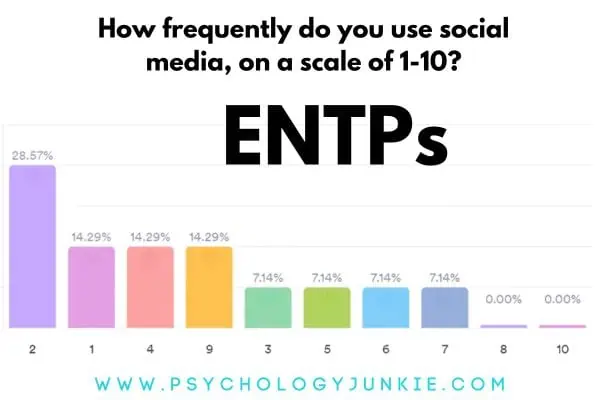
When I asked ENTPs how frequently they used social media on an average day on a scale of 1-10, with 1 being “Not at all” and 10 being “Extremely often”, 2 got 28.57% of the votes, while 1, 4, and 9 tied for second place with 14.29%. Overall, ENTPs preferred LinkedIn and Discord to more popular platforms like Facebook and Instagram. When it came to how ENTPs felt about social media as a whole, 71.79% said they thought it was “mostly unhealthy for people”, while 28.221% said it was “mostly healthy for people.” When ENTPs expounded on this, they felt that social media was exhausting because people were so apt to take things the wrong way, buy into misinformation, or think emotionally rather than logically.
More About ENTPs and Social Media:
- 42.86% of ENTPs said they frequently lost hours to scrolling on social media
- 23.08% of ENTPs said that social media had helped them develop closer relationships with others, while 38.46% said it had helped them “only a little.”
- 21.43% of ENTPs said that they struggled with comparing themselves to others on social media
The INTJ Personality Type
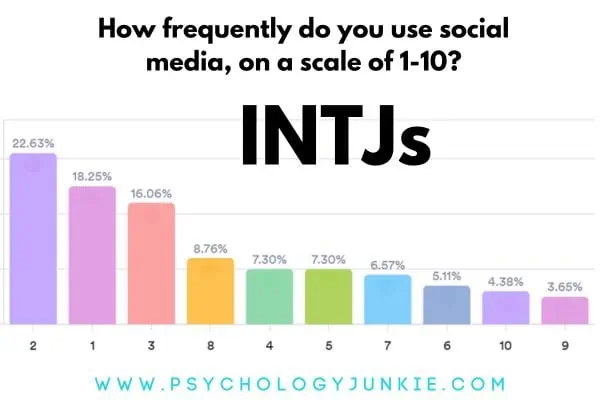
INTJs were not the biggest fans of social media, with 81.95% of them saying that it was “mostly unhealthy for people,” while 18.05% said it was “mostly healthy for people.” When asked on a scale of 1-10 how frequently they used social media on an average day, with 1 being “not at all” and 10 being “extremely frequently”, 2 got the most responses, with 1 following close behind. When I spoke with INTJs about this in more depth, they said that they felt social media was mostly shallow, focused on image and appearance and not meaning. They were concerned about disinformation, shortened attention spans, and the crumbling sense of community in neighborhoods and countries across the world. Even though INTJs are introverts and enjoy their alone time, they realize that people need in-person connections to get to know each other without forming a lot of preconceived judgments based on social media sharing. When it came to the platforms they did prefer, INTJs chose LinkedIn, Twitter, and Reddit, preferring intellectual exchanges over scrolling photos of people they knew.
More About INTJs and Social Media:
- Only 4.35% of INTJs said they struggled with comparing themselves to others on social media
- 12.23% of INTJs said they had developed closer relationships with others via social media
- 18.57% of INTJs said they frequently lost hours to scrolling on social media
Discover more about INTJs: INTJ In-Depth Profile
The ESFP Personality Type
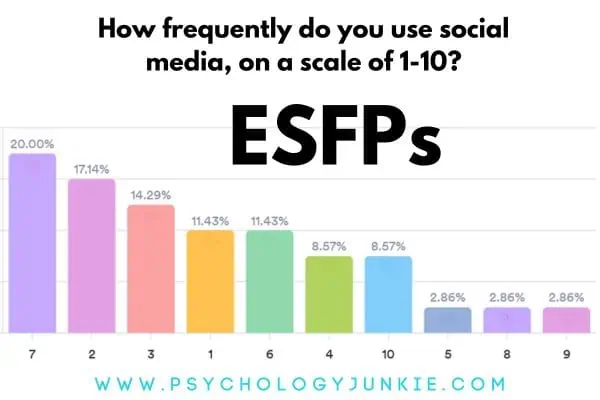
ESFPs were a pretty mixed bag when it came to their ideas on social media use. When asked on a scale of 1-10 how frequently they used social media on an average day, with 1 being “Not at all” and 10 being “Extremely frequently,” 20% of ESFPs voted for 7, while 17.14% voted for 2, 14.29% for 3, and 11.43% for 1. This really can’t tell us conclusively whether an ESFP you meet will be a frequent or less frequent social media user. But let’s get deeper into the results: 63.64% of ESFPs felt that social media was “mostly unhealthy for people,” while 36.36% thought it was “mostly healthy for people.” When I spoke to more ESFPs about this, they felt it was all about how you used it and didn’t like blanket statements condemning social media use altogether. Instagram, TikTok, and Facebook were the most popular social media apps for ESFPs, and they enjoyed the ability to gather information via short-form or long-form videos as well as keep up with their friend’s and family’s lives. Ultimately, most ESFPs who shared their thoughts believed that social media could be used as an outlet to connect with others more deeply, stay in touch with people across long distances, and gain information. The key is to get out in the real world and focus on in-person friendships just as much.
More About ESFPs and Social Media:
- 17.14% of ESFPs said they struggled with comparing themselves to others on social media.
- 37.14% of ESFPs said that social media had helped them develop closer relationships with others, with 17.14% saying it had only helped them “a little bit.”
- 28.57% of ESFPs said that they frequently struggled with losing track of hours while scrolling social media.
The INFJ Personality Type
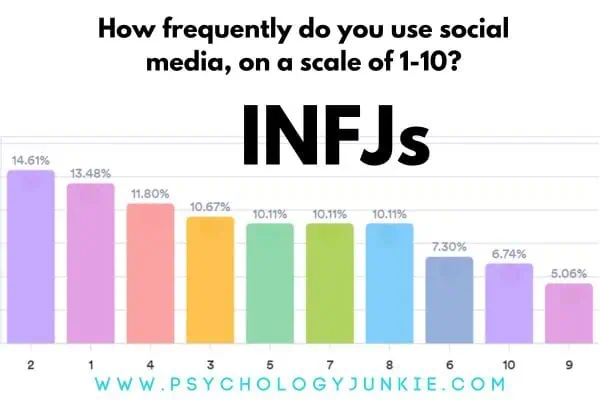
As you can see from the chart above, there’s a lot of variety in frequencies when it comes to the way INFJs spend time on social media. When asked on a scale of 1-10 how frequently they used social media each day, with 1 being “Not at all” and 10 being “Extremely frequently”, 38.76% of INFJs voted for options 1-3 (very low to no frequency), while 32.02% of INFJs voted for 7-10 (very high frequency). As far as how they felt about social media’s impacts on society, 76.40% said that they felt it was “mostly unhealthy for people,” and 23.60% believed it was “mostly healthy for people.” As I listened to more INFJs express their thoughts to me, it seemed that they believed it was all about how you used it. Yes, they saw the negative implications of social media (increased isolation, negative comparisons, image-orientation, narcissism), but they also saw some good like the ability to connect with others who have shared interests, bridge the gap between distances, and hear about life and perspectives beyond your local community. Ultimately, setting limits on social media time and making time for other apps like meditation apps, journaling apps, or research was the way to fulfillment for them.
More About INFJs and Social Media:
- 28.18% of INFJs said that they frequently lose track of hours while scrolling social media
- 20.11% of INFJs said that social media had helped them develop closer relationships with others, with 32.40% suggesting it had only helped “a little bit.”
- 13.48% of INFJs struggled with comparing themselves to others on social media
- Instagram, Facebook, and LinkedIn were the most popular social media channels for INFJs
Find out more about INFJs: INFJ In-Depth Profile
The ESTP Personality Type
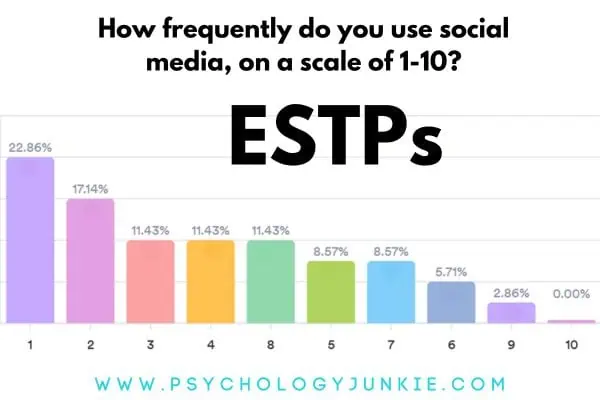
I was surprised by the results for ESTPs. In the same survey, I had asked each of the types what their favorite smartphone activities were, and 22.86% of ESTPs said “social media” was their favorite activity. However, when we look at frequency of use, they were one of the types with the lowest numbers. 51.43% of ESTPs voted between 1-3 when asked how frequently they used social media on a scale of 1-10 with 1 being “Not at all” and 10 being “Extremely frequently.” When ESTPs expressed more in their comments, they said that they’d rather be active and doing something than scrolling on social media. The sedentary nature of scrolling and the lack of real, practical conversations could leave them bored and restless. That said, some ESTPs also said they loved playing social games with others, looking for events to go to with friends, or watching funny reels and short-form videos for a good laugh. When it came to the social media apps they preferred, they enjoyed TikTok, Facebook, and Instagram the most.
More About ESTPs and Social Media:
- 77.14% of ESTPs said that social media was “mostly unhealthy” for people, with 22.86% saying it was “mostly healthy.”
- 23.53% of ESTPs said that they frequently lost track of hours while scrolling social media
- 13.89% of ESTPs said that social media had helped them develop closer relationships with others, while 22.22% said it had helped them “only a little.”
- Only 5.88% of ESTPs said that they struggled with comparing themselves with others on social media.
What Are Your Thoughts?
Do you have any thoughts or insights you’d like to share? Are you surprised or not by the results? Let us and other readers know in the comments section!
Remember, you can find out more about your personality in my eBooks, Discovering You: Unlocking the Power of Personality Type, The INFJ – Understanding the Mystic, The INTJ – Understanding the Strategist, and The INFP – Understanding the Dreamer. You can also connect with me via Facebook, Instagram, or Twitter!



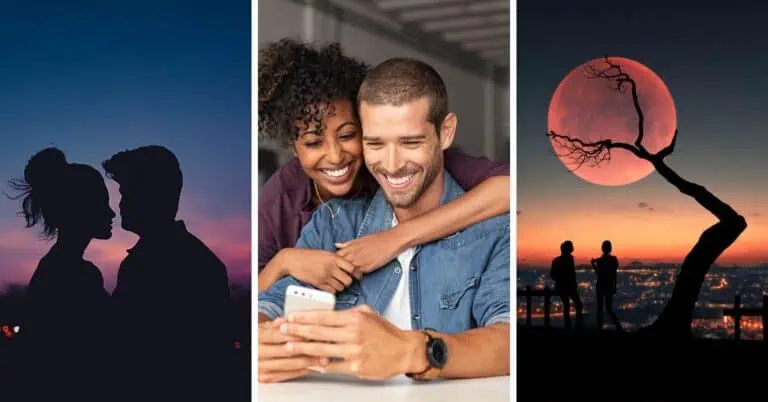
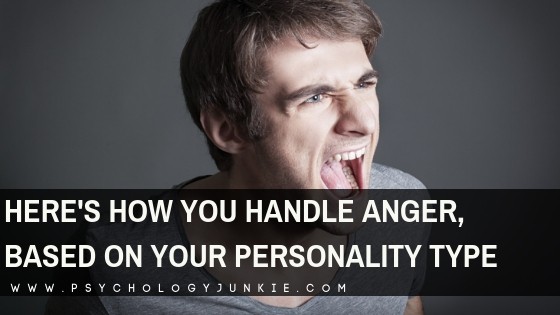

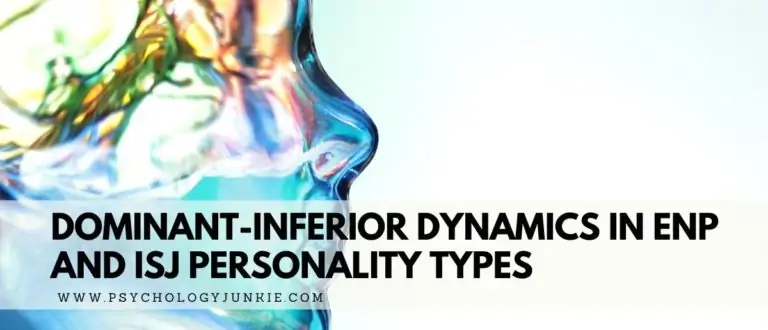
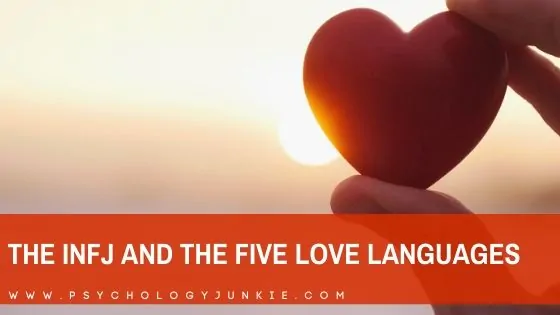

we should be asking people “how much do you know about anything?” and then test them to see how if they know anything about knowing anything!
Check how helpful you feel this would be:
_____ extremely
_____somewhat
_____ I don’t know
_____I don’t care
_____what is this about?
Hi Susan,
I wonder how honest people were in answering your survey questions? In my subjective view (and I may be off base here) Social Media is increasingly being reveled to be and seen as a largely mindless and mind-numbing diversion engaged in by frivolous people who either can’t or don’t want to think. So admitting to using it is sort of an implied admission of “air head” dumbness.
Haven’t we all just wanted to scream when the half-wit scrolling through their cell phone is walking around in public oblivious to the actual human beings around them? I know I have!
Also, I recall reading somewhere some years ago that Social Media has subtle built-in characteristics that effectively keep users in a state of sort of perpetual addled distraction. I wish I could remember what they are but I can’t off the top of my head.
im and ENFP and i can assure you we dont like to be in social media too often, i personally hate answering 5 messages from 5 users because i think is too much people, calls are more entertainment though you find weirdos or people forcing you to do a call or chat, i met a guy who felt lonely, and wanted me to be with him all day just to get mad at the end of the day, also we dont like to see content we dont like which usually we happen to see scrolling, 5 is accurate because other ENFP i know used social media often in certain hours, some days they stop and keep going the conversation other day, i usually give myself 1 hour to answer messages, usually i use twitter 4 hours or less daily because im learning a language otherwise i wouldnt use social media more than 2 hours, i hate adds, unwanted content and toxic people
My favourite part of this article:
” When I spoke with several INTPs during this process, they suggested that social media produced algorithms that catered to illogical and emotion-driven ways of responding to information. They felt like platforms like Facebook, Twitter, and TikTok sparked an “animal brain” emotional response from people that allowed disinformation to spread and real, analytical thought to diminish. I happen to agree with them, to be honest!”
I avoid social media and this is what I hate most about it. It’s all made to perpetuate all sorts of negative things and to keep people addicted. Every time I think maybe I’ll join Facebook, that’s when I hear about some scandal, whether it’s their algorithms spreading disinformation, or their complete disregard for their users’ privacy. Sometimes I think it would be good way for me to keep in touch with people because I suck at doing it the old fashioned way. I don’t like to talk on the phone and I rarely text people just to see what’s up. But then remember how much disdain I have for social media in general.
I also don’t think it’s fair to lump all of these platforms together. Reddit is basically a giant forum. You can lurk and go by a screen name. There are forums all over the internet and I’ve never really thought of them as social media. That’s very different from Facebook, Instagram, and Twitter/X, where people use those platforms as themselves. Even YouTube is a mix. Content creators may use it as themselves, while many users go by screen names just to watch videos and leave comments.
as an ENFP we like physical contact over text, no surprise we have a 5 3 and 1, i cant answer 5 messages on twitter from 5 users, find them annoying, while on social media we see content we dont likke so it becomes annoying at some point using social media, calls are fun though is 50/50 sometimes people force conversations too much it feels boring, thats probably why we dont use social media as other extroverts and we are mixed below 5, if i wasnt learning a language i wont waste my time in social media more than 2 hours a day